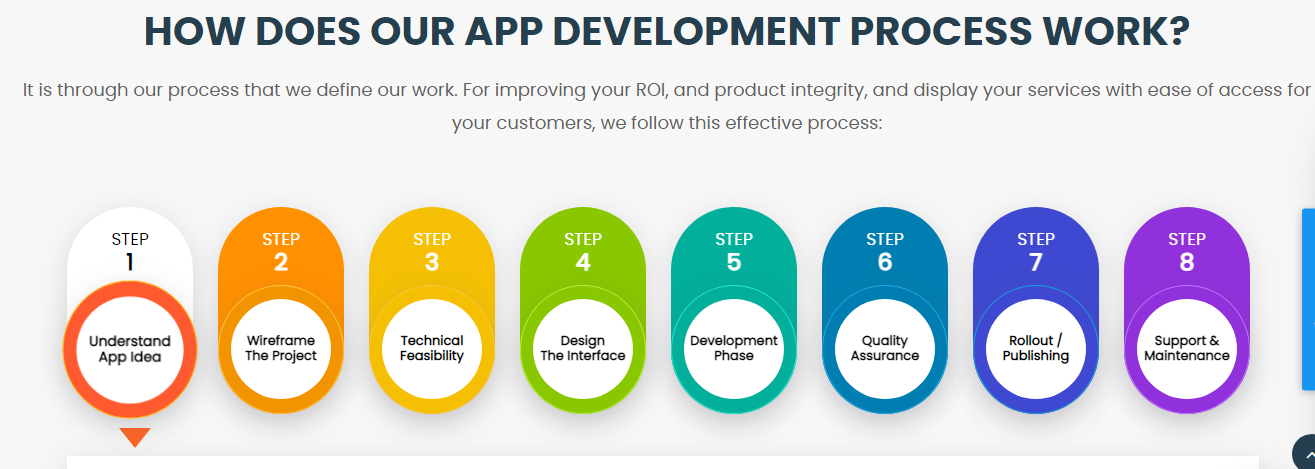App Development
We provide a wide range of Services
Mobile App Development Service in India
- Infosys: Infosys is a global IT services and consulting company based in India. They offer mobile app development services, including iOS and Android app development, cross-platform app development, and enterprise mobile solutions.
- Wipro: Wipro is another well-known Indian IT company that provides mobile app development services. They have expertise in native app development, cross-platform app development, UI/UX design, and app maintenance and support.
- TCS (Tata Consultancy Services): TCS is one of the largest IT services firms in India. They offer mobile app development services for various industries, including banking, healthcare, retail, and more. Their services cover iOS, Android, hybrid app development, as well as app testing and security.
- Mindtree: Mindtree is a global technology consulting and services company with a presence in India. They specialize in mobile app development, including native app development, cross-platform app development using frameworks like React Native, UI/UX design, and app testing.
- HCL Technologies: HCL Technologies is an Indian multinational IT services company that provides mobile app development services. They offer end-to-end app development solutions, including ideation, UI/UX design, development, testing, and deployment for iOS, Android, and cross-platform apps.
- Tech Mahindra: Tech Mahindra is an IT services and consulting company based in India. They offer mobile app development services for various platforms, including native app development, cross-platform app development, mobile application testing, and maintenance.
- OpenXcell: OpenXcell is a mobile app development company based in India that specializes in delivering custom mobile app solutions. They offer services for iOS, Android, and cross-platform app development, as well as UI/UX design, app testing, and support.
- Rejig Lounge: Rejig Lounge is one of the fast growing Mobile App development company in India delivering the best app development to its end-user with latest technologies under the guidance of expert and experienced team. For our App development portfolio contact us.

Mobile App Development basics
Mobile app development involves the process of creating software applications specifically designed to run on mobile devices like smartphones and tablets. Here are the basics of mobile app development:
Define Your App Idea: Begin by clearly defining your app idea and determining its purpose, target audience, and key features. Identify the problem your app will solve or the value it will provide to users.
Choose the Platform: Decide on the platform(s) you want to develop your app for, such as iOS (Apple), Android (Google), or both. Each platform has its own development requirements and programming languages.

Mobile App Development
Mobile app development refers to the process of creating software applications specifically designed to run on mobile devices, such as smartphones and tablets. It involves a series of steps, including ideation, planning, design, development, testing, deployment, and maintenance of mobile applications.
Mobile app development typically involves writing code using programming languages and frameworks specific to the target platforms, such as Swift or Objective-C for iOS apps or Java or Kotlin for Android apps. Developers use integrated development environments (IDEs) like Xcode or Android Studio to write and debug the code, as well as to access various tools and resources for app development.
The process of mobile app development includes defining the app’s purpose, identifying its target audience, designing the user interface (UI) and user experience (UX), implementing features and functionalities, testing for quality assurance, and deploying the app to app stores or other distribution channels.
Mobile app development can be categorized into two main approaches: native app development and cross-platform app development. Native app development involves building separate apps for each platform using the native programming languages and tools provided by the platform. Cross-platform app development, on the other hand, utilizes frameworks like React Native, Flutter, or Xamarin to build apps that can run on multiple platforms with a shared codebase.
The ultimate goal of mobile app development is to create mobile applications that provide value, solve specific problems, deliver a positive user experience, and meet the needs and expectations of the target audience. Continuous updates and maintenance are also important to ensure the app remains compatible with evolving technologies, operating systems, and devices, and to address user feedback and bug fixes.
How does Mobile App Development work
Mobile app development involves a series of steps and processes to create a functional and user-friendly mobile application. Here’s an overview of how mobile app development typically works:
- Idea and Planning: The process begins with ideation and planning. This involves defining the app’s purpose, target audience, key features, and overall concept. Conduct market research and competitor analysis to validate the app idea and identify unique selling points.
- User Experience (UX) Design: UX design focuses on creating a seamless and intuitive user experience. This involves creating wireframes, storyboards, and prototypes to visualize the app’s structure, navigation, and user flow. Consider user personas, usability, and accessibility principles to design an engaging and user-friendly interface.
- User Interface (UI) Design: UI design focuses on the visual elements of the app. Designers create the app’s aesthetics, including colors, typography, icons, and graphics. They ensure the design is consistent with the brand identity and aligns with current design trends and platform guidelines.
- Development: In this stage, developers write the code that brings the app to life. They use programming languages and frameworks specific to the target platforms, such as Swift or Objective-C for iOS apps or Java or Kotlin for Android apps. They implement the app’s features, integrate APIs and services, handle data management, and ensure smooth app performance.
- Testing: Testing is a crucial phase to identify and fix any issues or bugs in the app. Quality assurance (QA) testers perform various tests, including functional testing, usability testing, compatibility testing, and performance testing. They ensure the app functions as intended, provides a good user experience, and performs well on different devices and operating systems.
- Deployment: Once the app is thoroughly tested and ready, it is prepared for deployment. For iOS apps, it needs to go through the App Store review process, where Apple ensures it meets their guidelines. Android apps are typically published on the Google Play Store. Developers create developer accounts, prepare necessary assets like app icons and screenshots, and submit the app for review and approval.
- Maintenance and Updates: After the app is deployed, it requires ongoing maintenance and updates. This includes addressing user feedback, fixing bugs, optimizing performance, and adding new features. Regular updates are necessary to ensure compatibility with new device models and operating system versions.
Throughout the development process, collaboration between designers, developers, testers, and project managers is crucial. Project management methodologies like Agile or Scrum are often employed to ensure effective communication, timely delivery, and successful execution of the mobile app development project.
It’s important to note that mobile app development is an iterative process, and it may involve continuous improvements and updates based on user feedback, market changes, and emerging technologies.
Why is Mobile App Development Essential?
- Ubiquitous Mobile Usage: Mobile devices, such as smartphones and tablets, have become an integral part of people’s lives. Mobile apps provide convenient and instant access to information, services, and entertainment. Developing a mobile app allows businesses to tap into the ever-growing mobile user base and reach customers anytime and anywhere.
- Enhanced User Experience: Mobile apps offer a more personalized and immersive user experience compared to mobile websites. Apps can leverage device features like camera, GPS, accelerometer, and push notifications to deliver interactive and context-aware experiences. They can also provide offline functionality, allowing users to access content and features even without an internet connection.
- Direct Customer Engagement: Mobile apps enable direct and personalized communication with customers. Push notifications allow businesses to send relevant and timely updates, promotions, and reminders directly to users’ mobile devices. This direct engagement helps businesses stay connected with their customers, increase brand loyalty, and drive user engagement.
- Increased Efficiency and Productivity: Mobile apps can streamline business processes and improve efficiency. They can automate tasks, simplify complex operations, and provide real-time access to critical data and analytics. Mobile apps can also enhance internal communication and collaboration among team members, leading to increased productivity and streamlined workflows.
- Competitive Advantage: In today’s digital landscape, having a mobile app can provide a competitive edge. It allows businesses to differentiate themselves, enhance their brand image, and stay ahead of competitors. A well-designed and feature-rich app can attract and retain customers, build brand loyalty, and create a positive perception of the business.
- Revenue Generation: Mobile apps offer various revenue generation opportunities. Businesses can monetize their apps through in-app purchases, subscriptions, advertisements, or by offering premium features. Apps can also serve as a platform for e-commerce, allowing users to make purchases directly within the app. Additionally, apps can help businesses gather valuable user data and insights for targeted marketing and advertising campaigns.
- Customer Insights and Analytics: Mobile apps provide businesses with valuable data and analytics about user behavior, preferences, and usage patterns. This data can be used to understand customer needs, optimize app performance, and make data-driven decisions to improve the app and the overall customer experience.
- Brand Visibility and Recognition: Having a mobile app strengthens a business’s brand visibility and recognition. An app icon on a user’s home screen serves as a constant reminder of the brand, increasing brand recall and visibility. Additionally, satisfied app users are more likely to recommend the app to others, further enhancing brand reach and awareness.
Overall, mobile app development is essential in today’s digital landscape to enhance user experience, engage customers, improve efficiency, and gain a competitive advantage. It opens up new avenues for business growth, revenue generation, and customer engagement in an increasingly mobile-centric world.
Define who can get a mobile app developed
Mobile app development is not limited to a specific group or entity. Various individuals, businesses, organizations, and entrepreneurs can get a mobile app developed based on their specific needs and goals. Here are some examples of who can benefit from getting a mobile app developed: Small, medium, and large businesses across various industries can benefit from mobile app development. Startups often rely on mobile apps to launch their innovative ideas and disrupt existing markets. Entrepreneurs with a specific business idea or concept can explore mobile app development to turn their vision into a reality. Non-profit organizations can utilize mobile apps to raise awareness, collect donations, communicate with supporters, and provide information about their initiatives and activities. Schools, colleges, and universities can develop mobile apps to enhance the learning experience for students. Government agencies can develop mobile apps to improve citizen services, provide access to information and resources, facilitate online transactions, and enhance public engagement and participation. Service-based businesses, such as healthcare providers, fitness centers, salons, restaurants, or taxi services, can benefit from mobile app development to offer online booking, appointment scheduling, delivery services, loyalty programs, and other convenient features to their customers. Content creators, such as bloggers, influencers, news outlets, and media companies, can leverage mobile apps to deliver their content directly to users’ mobile devices, engage with their audience, and offer additional features like personalized content recommendations or offline access.
It’s important to note that while mobile app development offers great potential, it requires careful planning, proper budgeting, and collaboration with experienced app developers or development agencies to ensure a successful outcome.
How much does it cost to develop a mobile application?
The cost of developing a mobile application can vary significantly depending on several factors, including the complexity of the app, the features and functionalities required, the platform(s) targeted, the development approach (native or cross-platform), the location of the development team, and the level of customization and design.
